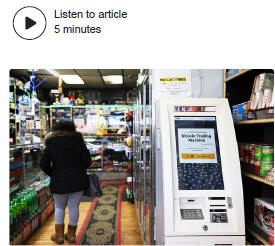About four out of five of the ATM users have an income of less than $80,000, and the median transaction size on a kiosk is merely $180.
For now, the crypto ATM market is relatively fragmented and dominated by small operators. Bitcoin Depot, which is the largest, has a 17.6% marketshare, according to Coin ATM Radar. Its competitors include CoinCloud and CoinFlip, and altogether the top 10 operators only run about two-thirds of the market.
“A lot of the small players have just folded up and decided that it’s too costly to operate,” says Eric Grill, CEO of ChainBytes, which manufactures crypto ATMs.
A small operator, for example, might have to pay for an armored car service and for compliance personnel to satisfy federal and state rules around money transfers, Grill says. The machines have become a favorite for swindlers who direct customers to send money as part of scams, Grill says.
Last year, the Federal Trade Commission warned of a scam in which fake Border Patrol agents threatened victims that their financial accounts would be frozen if they didn’t send crypto via one of the ATMs. The U.S. Government Accountability Office in a December 2021 report said crypto kiosks were sometimes used to facilitate human trafficking.
The kiosks have also come under criticism for their high fees. Among operators that report the data, most machines have fees that range between 8% and 16% to buy tokens, according to Coin ATM Radar, and between 5% and 15% to sell.
“The fees are exorbitant from any perspective. They’re just another phony predatory way to prey on the poor,” says John Reed Stark, a former SEC enforcement attorney who has been a frequent crypto skeptic.
Bitcoin Depot’s Mintz in a statement through a spokeswoman said that his company’s customers are willing to pay higher fees than they would on an exchange to have the ability to use cash to purchase crypto and get easier-to-reach customer service, among other reasons.
“All of this points to the reality that customers of Bitcoin ATMs are willing to pay more than many online options to have the convenience, ease of use, and speed that Bitcoin ATMs including ours supply,” Mintz said.
Other crypto companies have found it difficult getting the approvals needed from the Securities and Exchange Commission to go public. Crypto company Circle Internet Financial Ltd. called off its own SPAC merger late last year after the SEC didn’t approve a required registration statement by a deadline.
“Our conversations are proceeding well with the SEC. We remain on track to close later this quarter and we currently don’t anticipate any delays in this timing,” said Mintz.
An SEC spokeswoman declined to comment.
Write to Joe Light at joe.light@barrons.com

